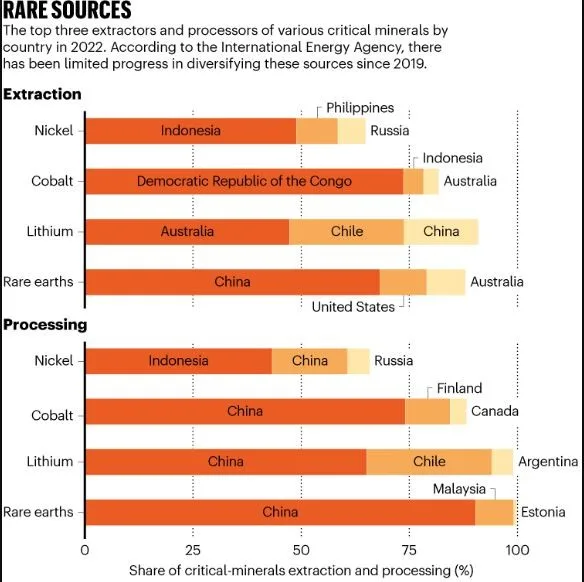Syllabus: GS3/Economy
Context
- The Union Cabinet has approved the launch of the National Critical Mineral Mission (NCMM) with an expenditure of Rs.16,300 crore.
About
- Aim: To create a fast track regulatory approval process for critical mineral mining projects.
- The NCMM will encompass all stages of the value chain, including mineral exploration, mining, beneficiation, processing, and recovery from end-of-life products.
- Features:
- Setting up mineral processing parks and supporting the recycling of critical minerals.
- Promote research in critical mineral technologies and proposes setting up Centre of Excellence on Critical Minerals.
- It also proposes development of a stockpile of critical minerals within the country.
- It encourages Indian PSUs and private sector companies to acquire critical mineral assets abroad and enhance trade with resource-rich countries.
What are Critical Minerals?
- Critical minerals are those minerals that are essential for economic development and national security.
- The future global economy will be underpinned by technologies that depend on minerals such as lithium, graphite, cobalt, titanium, and rare earth elements.
- These are essential for the advancement of many sectors, including hightech electronics, telecommunications, transport, and defence.
- Supply Chain Vulnerability: Due to the lack of availability of these minerals and concentration of extraction or processing in a few geographical locations.
- Hence, it has become imperative to identify and develop value chains for the minerals which are critical to country.

Applications of Critical Minerals
- Clean technologies initiatives such as zero-emission vehicles, wind turbines, solar panels etc.
- Critical minerals such as Cadmium, Cobalt, Gallium, Indium, Selenium and Vanadium and have uses in batteries, semiconductors, solar panels, etc.
- Advanced manufacturing inputs and materials such as defense applications, permanent magnets, ceramics.
- Minerals like Beryllium, Titanium, Tungsten, Tantalum, etc. have usage in new technologies, electronics and defense equipment.
- Platinum Group Metals (PGMs) are used in medical devices, cancer treatment drugs, and dental materials.
List of Critical Minerals
- Different countries have their own unique lists of critical minerals based on their specific circumstances and priorities.
- A total of 30 minerals were found to be most critical for India: Antimony, Beryllium, Bismuth, Cobalt, Copper, Gallium, Germanium, Graphite, Hafnium, Indium, Lithium, Molybdenum, Niobium, Nickel, PGE, Phosphorous, Potash, REE, Rhenium, Silicon, Strontium, Tantalum, Tellurium, Tin, Titanium, Tungsten, Vanadium, Zirconium, Selenium and Cadmium.
| Minerals Security Partnership (MSP) – The MSP currently consists of 23 partners, including Argentina, Australia, Canada, Estonia, Finland, France, Germany, Greenland, India, Italy, Japan, Kazakhstan, Mexico, Namibia, Norway, Peru, the Republic of Korea, Sweden, Ukraine, the UK, the US, Uzbekistan, and the EU (represented by the European Commission). – It aims to catalyse public and private investment in critical mineral supply chains globally. – India is already a member of the Intergovernmental Forum on Mining, Minerals, Metals and Sustainable Development, which supports the advancement of good mining governance. |
Initiatives by India to Secure Critical Mineral Supplies
- Mines and Minerals (Development and Regulation) Act, 1957, has been amended in 2023 to increase exploration and mining of critical minerals.
- Exploration Projects by GSI: Geological Survey of India (GSI) has undertaken 368 exploration projects for critical minerals over the past three years, with 195 projects currently underway in FS 2024-25.
- For FY 2025-26, GSI is going to take up 227 projects for various critical minerals.
- KABIL: It is a joint venture of the Ministry of Mines, it has acquired an area of about 15703 Hectare in the Catamarca province of Argentina, for exploration and mining of Lithium.
- Custom Duty: Government has already eliminated customs duties on the majority of critical minerals in the Union budget 2024-25.
- This will increase the availability of critical minerals in the country and will encourage the industry to set up processing facilities in India.
Way Ahead
- India is collaborating with countries such as Africa, Argentina, Australia and Mongolia to secure its energy requirements.
- In Tanzania, India is pitching for access to resources such as niobium and graphite; in Zimbabwe for lithium, and for copper and cobalt in Congo and Zambia.
- Critical minerals have become essential for economic development and national security in the country.
- Minerals such as Lithium, Cobalt etc. have gained significance in view of India’s commitment towards energy transition and achieving net-zero emission by 2070.
Source: TH
Previous article
Credit Guarantee Scheme for MSMEs
Next article
PM Surya Ghar Scheme